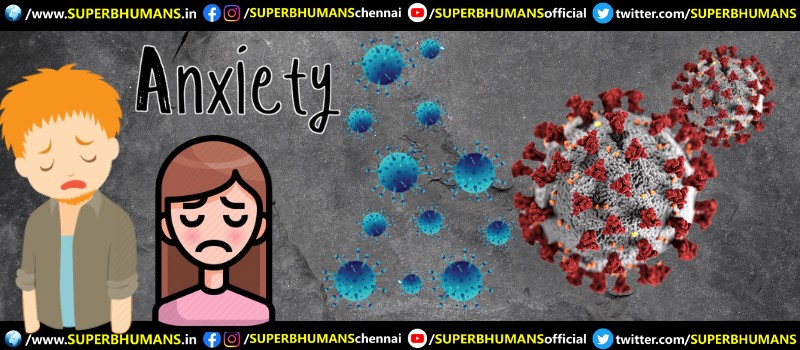Anxiety and Our Children

Posted by Team SUPERBHUMANS on 2021-06-12
Our children’s reaction to a community-wide traumatic event (like this pandemic COVID) is determined by various factors such as their cognitive understanding, family dynamics, and their attitude and stress coping mechanisms (Resilience)
Today is best time to teach our children social and emotional skills that will indeed increase their ability to deal with uncertainty, stress and worry.
Resilience goes up by good relationships from caregivers, social support, positive relationships with teachers, academic engagement (continuous learning), community cohesion and links with cultural values.
We need to be ROLE MODELS for our children and show them how to react to stressful times by coping with anxiety in healthy ways.
Do first check with yourselves before we check in with our children.
So parents, how are YOU? How are you dealing with stress, worries during these uncertain times? If you haven’t already, now is the time to pause and ask yourself how you’re really coping?
Self-Awareness is the STARTING POINT.
Let’s pay attention to your thoughts, how we have become accustomed to feeling and whether your body’s reflecting your current state of stress or relaxation?
Learn some techniques to calm the mind and remain attentive to the moment will help with this. This S.T.O.P for Mindfulnesstechnique to feel more present and calmer.
When it comes to anxiety and our kids, we can be see in our children in different ways - from sleep cycle changes and appetite disturbances, behaviour changes to physical ailments such as stomach pain, obesity, rapid weight loss or frequent headaches.
The 1st step with helping our kids deal with anxiety is to observe and listen to them, being present, attentive and connecting.
When we love someone and see them struggling, our instinct can be to fix the problem or make it go away. We focus on presenting counter-arguments, reassuring or distracting them from their pain. This results in them feeling unheard and leads them to increasing feelings of isolation and disconnection.
Non-judgmental, generous and kind listening is the key for the child to feel validated and understood, the essential foundation to being able to connect and help.
Active listening is a skill we parents must learn and practiced.
With helping children cope with anxiety it is useful to move away from reassurance and into problem solving, our kids need solutions during these uncertain times.
Dr Sachin Coach, provides simple and practical solutions we can use to help our children manage anxiety and minimise the negative psychological impacts of the current crisis on them. He cites:
- looking after our own mental wellbeing (practicing MINDFULNESS)
- providing clear, age-appropriate information (not NEWS, but SCIENCE)
- Assuring our children that they are at low risk and that there is a definiteplan to manage the overall risk of the virus or any other eventuality
- Limiting exposure to news and social media reporting related to COVID-19 (Right source of information, not NEWS)
- Maintaining routines and stick to them, HABITS make us break us.
- Assisting our children and adolescents to maintain social contacts via internet-based means - Zoom your friends, video chats are good (use 20-20-20 formula to not strain your eyes)
- Involving children in a family plan to mitigate risk and promote positive mental and social wellbeing.
- Family that plays together, stays together - play games on daily basis (board games are best)
- Family breakfast and dinners are the best time to connect
- Write daily GRATITUDE, counting your blessings keeps us positive.
- Exercise - 15 minutes minimum releases BDNF (Brain Derived Neuro Trophic Factor) & Endorphins (Happy hormones)
- SLEEP, this is crucial - maintain your circadian clock rhythms. Early to BED and early to RISE is the key to both mental and physical health.
- During these pandemic time, we started our SUPERBmind – Train your Brain session to improve general health of mind and body
Needing some extra help with teaching your student or child Life Skills? Connect with us and we will be in touch shortly to help find the best solution for you. Also, don't forget to connect with us on Facebook, Twitter, Youtube,Linkedin and Instagram.